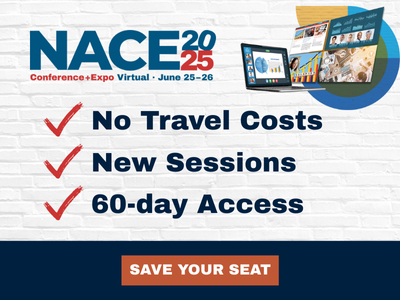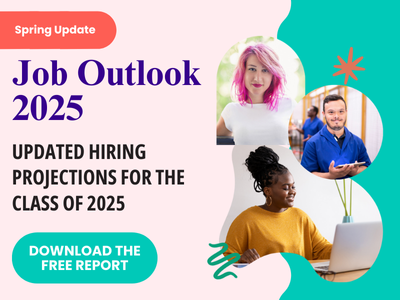NACE Journal, May 2020
It seems like you don’t have to look far to find criticism regarding the value of a college degree. In fact, some critics (and graduates who are riddled with heavy student loan debt) are recommending a harkening back to vocationally focused education as apprenticeships and trades seem to provide a more lucrative benefit.1 College leaders try to respond to this challenge in well-intentioned ways, hoping to remind the public that the value of a college degree is about so much more than getting a job. However, that doesn’t stop the pressure being placed upon college career centers to not only prepare students for the jobs that don’t exist yet, but also to get students those jobs directly upon graduation.
Rollins College, a small, private institution, located in Winter Park, Florida, serves just over 2,000 College of Liberal Arts undergraduates. As a liberal arts school, Rollins is no stranger to the value-proposition critique. Four years ago, with our quality enhancement plan (QEP) serving as the catalyst, we prioritized career and life planning as a top strategic initiative. The directive from the college president—to more explicitly articulate to our constituents the value of a Rollins education—came at a pivotal time in Rollins’s history, when many were growing increasingly critical of the job prospects for liberal arts graduates.
Since the fall of 2015, we have undertaken an ambitious enterprise, not only working to prepare our students for meaningful lives and productive careers post-graduation, but also to transform a campus culture. Before this project started, “career services” was viewed by some as the professionalization, and thus degradation, of the liberal arts ethos. A 2014 survey revealed that recent Rollins alumni were generally dissatisfied with their career preparation; nearly 30 percent reported that they had never even interacted with the Office of Career Services during their time at Rollins.
Related Resources
Creating a Culture of Collaboration With Career ChampionsThe Career Studio: Flipping the Career Center
Faculty Engagement Strategies (on-demand webinar)
With a presidential directive in place and a QEP focused on career development for students, a cross-functional team was tapped to fully implement an entirely developmental, integrative, and sustainable action plan. That plan became known as R-Compass. (Fun fact: The Rollins mascot is the Tar—an outdated term for a sailor, so much of our nomenclature is nautical by nature.) While many committees and leaders have helped to evolve R-Compass into its current form, the present leadership team is mainly comprised of four individuals—the director of undergraduate advising and academic support; two associate deans; and myself, the director of career development. Together, we have been tasked with infusing career-focused initiatives into the academic and co-curricular fabric of the Rollins student experience.
What Is R-Compass?
At its core, R-Compass is a formalized plan to arm faculty advisers with tools and resources that help them infuse career and life planning principles into the academic advising relationship with students. The plan involves a comprehensive professional development program for faculty advisers; a faculty peer mentor program; a required R-Compass Fair for all 500 to 600 first-year students; a new career-focused peer mentor position for student leaders; a four-year planning tool template; career document review training for all campus tutors and writing consultants; and explicit career outcomes publicized on academic department websites.
One of the few shared experiences that all Rollins students have is a relationship with their faculty adviser, who is a full-time, tenure-track professor (there is no professional advising model for our College of Liberal Arts students). Because research has shown that capitalizing upon this significant relationship could lead to greater career outcomes for students,2 our plan focuses on strengthening the advising experience in general.
Prior to R-Compass, adviser training and development were haphazard; if a student received excellent advisement, it was dependent upon the faculty member’s instincts as opposed to the result of a formalized training program. With the advent of a full-time staff position devoted to making adviser training accessible, relevant, and incentivized for faculty members, regular professional development sessions were launched. The focus of these trainings is relationship-building with students. Faculty are given opportunities to role play appreciative advising conversations that help students visualize their academic and career journeys at Rollins and beyond.
As of November 2019, 75 percent of Rollins faculty had voluntarily participated in adviser training, and 26 faculty peer mentors, known as R-Compass advising mentors (RCAMs), were serving as champion advisers to their peers. These RCAMs participate in a weekend-long intensive training program that deputizes them as uber-advisers on our campus for a two-year period. A powerful indicator of success for this program is the ever-growing waiting list of faculty who have expressed their interest in serving on future cohorts. This attention to the faculty advising experience was critical to cultural shift; with nearly 200 faculty members on campus, their buy-in and support of career-focused initiatives provided a much-needed springboard for further institutionwide integration.
Once that groundwork had been laid, the full infusion of career and life planning could begin.
The Next Step: Student Affairs Infusion
Recall that Rollins’s career services office had been underused by alumni. Although half of young alumni respondents believed that staff were helpful, the office had experienced some of the same challenges as their national peers: Workshops were not well attended,3 satisfaction with the office was low,4 and the faculty had little faith in career services as a whole.
At the behest of a new vice president for student affairs, the Office of Career Development and the Office of Experiential Learning were merged; together, they became the Center for Career & Life Planning. (We often refer to the whole operation as the “career center” or “center” for short.) For the first two years of the merger, the main task for the center was to respond to heavy staff attrition and to develop a cohesive mission.
Once new staff members were hired, our team began to work on an overhaul of the center, its services, and its campus reputation. One-off workshops were replaced with targeted classroom and student organization presentations where a captive audience already existed. We leveraged relationships with faculty and our student affairs colleagues to gain access to students and provided content that was relevant to established courses and groups.
“Market Your Experience” guides were created for various co-curricular activities so that students could visualize how to translate engagement in student organizations and in key leadership positions to their resumes and in interviews. All departments within the student affairs division were also held accountable for assessing how they communicate to students the transferable skills inherent in their programs. As a result of career-focused partnerships within student affairs, nearly 1,300 students participated in targeted career outreach presentations. Additionally, the 12 “Market Your Experience” guides that were created prompted additional outreach requests. In the fall of 2017, just two years into R-Compass, all 14 student affairs programs had created learning outcomes associated with the assessment of students’ transferable skill attainment.
Even with all this progress, we still lacked curricular reach.
Movement Toward Curricular Integration
Research suggests that engaging college students in career-focused conversations earlier and more often in their academic tenure correlates to better career outcomes for students and alumni.5 In response, a liaison program was created that paired a career center staff member with each section of the Rollins required first-year seminar course. These courses are unlike typical freshman seminars in that the content is not standardized and it is closely related to the discipline of the faculty member teaching the course. In all, there are typically 30 to 35 sections of these courses, so each of our staff works with three to five sections as a liaison. Career liaisons coordinate with faculty to share developmentally appropriate career content with first-year students; this happens via regular email messages, one-on-one meetings, and, most commonly, in classroom presentations. In 2015, the year prior to the start of the career liaison initiative, only 17 freshmen voluntarily set up one-on-one appointments with a career staff member; four years later—2019—through one-on-one appointments and invitations from faculty for liaisons to present in their classrooms, 80 percent of our first-year class engaged with us.
Reaching nearly all first-year students was the first widespread step to achieving full integration (the “meeting students earlier” part of the equation), but how could we grapple with the “more often” part? The strong alliance our center’s leadership had with academic affairs paved the way for a new, exciting, and required endeavor: a resume assignment built into the only common, standardized course mandated for all Rollins students in the College of Liberal Arts—“Health and Wellness.” The nine dimensions of wellness6 serve as the foundation for the course, so the R-Compass leadership team designed an assignment to elevate the career wellness dimension. Not only are students required to submit a resume as part of their assignment, but they must visit the career center so a staff member can review it. To receive credit, the student submits a polished resume and a reflection of his or her experience with the career center. This allows not only for quality control and assessment, but it guarantees that 100 percent of students meet with us. Students can take the course at any point in their undergraduate experience, but it is required for graduation, so this initiative has been a game-changer for career-focused curricular infusion and expansion.
To provide additional voluntary options for students, elective careers classes were enhanced to include new courses on financial literacy, how to navigate the world of work with a visible and/or invisible disability, and how to make any major marketable. All sections of these courses feature engagement with the career center, and many courses are co-taught by Rollins faculty and career staff. Future course offerings, already in the planning phase, will include digital literacy and advanced topics to cater to the specific career needs of adult learners. These courses not only provide students with practical skills that complement their liberal arts experience, but they also give our staff the opportunity to engage with students and faculty in the classroom, sustaining those relationships so crucial to the hallmarks of a personalized Rollins experience. Course evaluations and anecdotal student feedback have demonstrated the value of these courses, and our faculty state that they feel more confident in their ability to infuse career preparation into their discipline-specific courses.
So, how did we get here?
Early Success, But Still a Work in Progress
While the formula may not yet be fully set, the ingredients have been simmering for years: Innovation plus intentional collaboration have given us the pathway toward integration. Not only did our career center capitalize on our already collaborative relationships across campus to uplift the career conversation, but we also took the time to revise unit mission statements and introduce new, cutting-edge programs to amplify the career experience for our students. Both our internship and student employment agendas were enhanced to infuse career development requirements and principles. A new career champions mentor program was installed to connect Rollins alumni to current students who are in need of career-focused mentorship.
After researching the University of Nevada, Reno’s career studio model,7 we quickly decided that a studio of our own might provide the lynchpin necessary to bring the career journey experience to the forefront for our students. Indeed, in 2018, the first year of the Rollins career studio, nearly 200 students regularly dropped in each month for career guidance, even though the office was located on the periphery of campus.
Because of the infusion of required resume assignments, enhanced careers courses, and a robust first-year career liaison program, students have now flocked to our space; in fact, many have become regulars, returning repeatedly throughout the course of the year.
Although Rollins is a small, private, liberal arts institution, its career center is much like many others, persistently searching for ways to prepare students for a constantly evolving job market. The Rollins solution has been to capitalize on the advent of R-Compass and to evolve it into a multi-pronged approach to further infuse principles of career development into academic affairs and student affairs. What made this cultural shift possible was a perfect storm for change: 1) institutional leadership with an eye toward intentional and future-focused strategic planning, 2) a QEP devoted to infusing career preparation into academic advising, and 3) a career center that was committed to innovation and collaboration.
Although 2020 marks the fifth year of formalized R-Compass assessment—and the cultural shift is palatable—there is still work to do. For instance, we have really focused so much on meeting with students early on and often that only time will tell as to whether or not this approach will actually realize our students’ job attainment outcomes: Will they get jobs at higher rates upon graduation, and will those jobs be better than those secured by their predecessors? Or, will we see little job attainment shift early on, but more awareness of career principles that will help alumni navigate their own future career journeys more effectively and independently? Either way, the literature out there is on our side; it suggests that an integrative methodology is a worthwhile endeavor.
That said, if you are looking for a way to truly embed the career journey into the fabric of your institution, a focus on assessment and measured outcomes has to be tantamount to program and service enhancement. As you continue to evaluate and revise approaches, philosophies, and strategies, keeping the return on investment top of mind will be key. Identifying a common goal is also necessary. Is your goal to impact overall job attainment, is it cultural shift, or is it simply to infuse the career conversation into as many layers of the student experience as possible? Rollins has enjoyed early success with a focus on the latter, which we are hopeful will indirectly impact the other possible outcomes. This process is far from complete, and our students’ outcomes related to job and career attainment will continue to be monitored over time. There is hope, however, that new alumni will speak about the strong relationships they built with their peers, their faculty advisers, and the Rollins career center staff, all of whom were intentionally committed to their success as they pursue meaningful lives and productive careers.
Endnotes
1 St-Esprit, M. (2019). The stigma of choosing trade school over college. The Atlantic.
2 Habley, W.R. (2004). Faculty advising: Practice and promise. In G. L. Kramer (Ed.), Faculty advising examined (pp. 23-39). Nolton, MA: Anker.
3 Auter, Z., & Marken, S. (2016). One in six U.S. grads say career services was very helpful. Gallup-Purdue Index.
4 Feldman, R. S. (2005). Improving the first year of college, research and practice. Lawrence Erlbaum Associates, New Jersey.
5 Ibid.
6 Melnyk, Bernadette Mazurek (2018). Wellness 101: 9 dimensions of wellness. American Nurse Today, 13(1), 1, pp. 1-2.
7 Calhoon, M.T. (2018). The career studio: Flipping the career center. NACE Journal, 78 (3.) National Association of Colleges and Employers.






